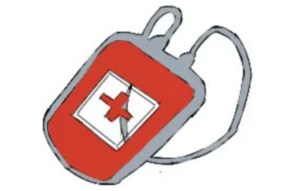
On April 14, Zhongshan Hospital affiliated to Fudan University successfully completed the first ABO blood type incompatible relative living donor kidney transplantation in Shanghai. The Zhongshan Hospital kidney transplantation team led by Professor Zhu Tongyu helped 47-year-old mother Jiang donate her left kidney to her 24-year-old son Xiaojiang. On May 4, Xiaojiang, who had recovered well, completed the discharge procedures: “I feel very lucky. In the most difficult time, the experts of Zhongshan Hospital helped me wholeheartedly and gave me a new life.”
Blood type intolerance can’t even be used for ordinary blood transfusion?
Yes! Blood type intolerance can lead to hyperacute rejection and blood type disorder, which is an absolute contraindication for kidney transplantation. This is the cleverness of the operation, let me tell you in detail
In August 2015, Xiaojiang, who had worked in Shanghai for many years, felt that he had been very tired recently. After going to the hospital for examination, he was found to have glomerulonephritis. After that, he went to many hospitals, but failed to curb the development of the disease, and eventually developed into “uremia” and could only rely on hemodialysis to survive. Mother Jiang couldn’t bear the pain of long-term hemodialysis for her son at such a young age. After consulting many people, she came to the clinic of Dr. Rong Ruiming, chief physician of the Urology Department of Zhongshan Hospital Affiliated to Fudan University, and expressed her hope to donate her kidney to her son.
Zhongshan Hospital was the first in China to carry out large-scale living donor kidney transplantation. For doctors, this was a routine operation. However, during the preoperative examination, it was unexpectedly discovered that Mother Jiang was type A blood, while Xiao Jiang was type O blood. Anyone with a little medical knowledge knows that even for ordinary blood transfusions, the first thing that must be guaranteed is that the ABO blood type of the donor and the recipient is compatible, otherwise it will lead to severe hemolytic reactions. The traditional view is that ABO blood type incompatible kidney transplantation can lead to hyperacute rejection and blood type disorders, which is an absolute contraindication for kidney transplantation. There is no precedent in Shanghai for organ transplantation across blood type barriers. Can this seemingly impossible task succeed?
Professor Zhu Tongyu Zhongshan Hospital is fully capable of overcoming blood type barriers and achieving the same survival rate as ABO blood type compatible patients. Led by Professor Zhu Tongyu, the Zhongshan Hospital kidney transplantation team consulted a large number of domestic and foreign literatures, and after discussions and discussions with many domestic experts and scholars, they finally decided to perform kidney transplantation for Jiang’s mother and Xiao Jiang! Professor Zhu Tongyu introduced: “With the help of new immunosuppressants and desensitization therapy, ABO blood type incompatibility will no longer be a contraindication for kidney transplantation. Based on the existing conditions, Zhongshan Hospital is fully capable of overcoming blood type barriers and achieving the same survival rate as patients with ABO blood type compatibility.”
After listening to the opinions of the kidney transplantation team, the experts of the hospital’s ethics committee agreed to the surgery application after careful consideration. Professor Rong Ruiming explained the relevant situation to Xiao Jiang and his mother objectively and in detail. Xiao Jiang and Jiang’s mother expressed their full trust in Zhongshan experts and were willing to accept ABO blood type incompatible kidney transplantation. Professor Zhu Tongyu took the lead in organizing a coordination meeting of relevant departments. Chief Physicians Rong Ruiming and Xu Ming of the Urology Department, Deputy Chief Physician Zou Jianzhou of the Nephrology Department, Attending Physician Shen Bo, and Chief Technician Yao Dinggen of the Blood Transfusion Department formulated a detailed treatment plan and schedule: Anti-B cell monoclonal antibodies were first used before surgery to eliminate most of Xiao Jiang’s B cells so that he could not produce new anti-A antibodies; at the same time, immunosuppressants were taken at maintenance doses for ten days. After that, through two plasma exchanges, Xiao Jiang’s anti-A antibody titer was reduced from 1:128 before treatment to 1:8. However, when the surgery was originally planned on April 11, an accident occurred, and Xiao Jiang’s anti-A antibody titer rose to 1:32 again, which means that although the B cell count is 0, there will still be a small number of B cells producing antibodies. The doctors decisively revised the surgical plan and performed plasma exchange again to confirm that Xiao Jiang’s anti-A antibody titer had stabilized and dropped to 1:8. On April 14, Professor Zhu Tongyu personally took charge, and Chief Physician Xu Ming and Chief Physician Rong Ruiming completed the laparoscopic nephrectomy and kidney transplantation respectively. The operation was very successful, and Xiao Jiang’s renal function has now returned to normal.
“If patients with uremia want to wait for a kidney organ with a completely compatible blood type to appear, it will take at least ten years.” Chief Physician Rong Ruiming said that organ shortage has always been a problem faced by the world, and the contradiction between supply and demand is more prominent in my country. Living relative kidney transplantation in the “family mutual assistance and self-help” model is still the first choice for many patients with end-stage renal disease. If ABO blood type incompatible kidney transplantation can be carried out and promoted, it means that 1/3 of kidney donors can be increased in view of the current situation of severe shortage of kidney donors in my country, so that more patients with uremia can get the opportunity to receive kidney transplants.



